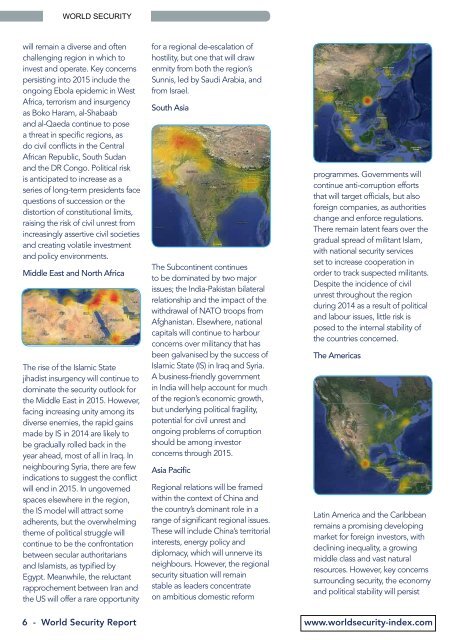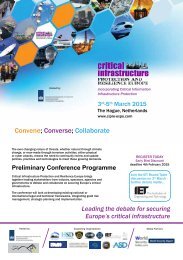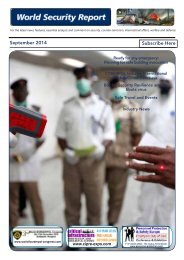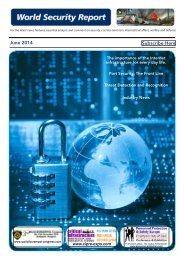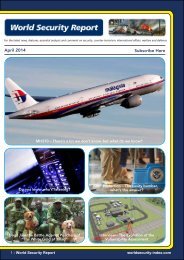World Security Report Jan 2015
World Security Report is a prime source of online information and analysis on security, counter-terrorism, international affairs and defence
World Security Report is a prime source of online information and analysis on security, counter-terrorism, international affairs and defence
Create successful ePaper yourself
Turn your PDF publications into a flip-book with our unique Google optimized e-Paper software.
WORLD SECURITY<br />
will remain a diverse and often<br />
challenging region in which to<br />
invest and operate. Key concerns<br />
persisting into <strong>2015</strong> include the<br />
ongoing Ebola epidemic in West<br />
Africa, terrorism and insurgency<br />
as Boko Haram, al-Shabaab<br />
and al-Qaeda continue to pose<br />
a threat in specific regions, as<br />
do civil conflicts in the Central<br />
African Republic, South Sudan<br />
and the DR Congo. Political risk<br />
is anticipated to increase as a<br />
series of long-term presidents face<br />
questions of succession or the<br />
distortion of constitutional limits,<br />
raising the risk of civil unrest from<br />
increasingly assertive civil societies<br />
and creating volatile investment<br />
and policy environments.<br />
Middle East and North Africa<br />
The rise of the Islamic State<br />
jihadist insurgency will continue to<br />
dominate the security outlook for<br />
the Middle East in <strong>2015</strong>. However,<br />
facing increasing unity among its<br />
diverse enemies, the rapid gains<br />
made by IS in 2014 are likely to<br />
be gradually rolled back in the<br />
year ahead, most of all in Iraq. In<br />
neighbouring Syria, there are few<br />
indications to suggest the conflict<br />
will end in <strong>2015</strong>. In ungoverned<br />
spaces elsewhere in the region,<br />
the IS model will attract some<br />
adherents, but the overwhelming<br />
theme of political struggle will<br />
continue to be the confrontation<br />
between secular authoritarians<br />
and Islamists, as typified by<br />
Egypt. Meanwhile, the reluctant<br />
rapprochement between Iran and<br />
the US will offer a rare opportunity<br />
for a regional de-escalation of<br />
hostility, but one that will draw<br />
enmity from both the region’s<br />
Sunnis, led by Saudi Arabia, and<br />
from Israel.<br />
South Asia<br />
The Subcontinent continues<br />
to be dominated by two major<br />
issues; the India-Pakistan bilateral<br />
relationship and the impact of the<br />
withdrawal of NATO troops from<br />
Afghanistan. Elsewhere, national<br />
capitals will continue to harbour<br />
concerns over militancy that has<br />
been galvanised by the success of<br />
Islamic State (IS) in Iraq and Syria.<br />
A business-friendly government<br />
in India will help account for much<br />
of the region’s economic growth,<br />
but underlying political fragility,<br />
potential for civil unrest and<br />
ongoing problems of corruption<br />
should be among investor<br />
concerns through <strong>2015</strong>.<br />
Asia Pacific<br />
Regional relations will be framed<br />
within the context of China and<br />
the country’s dominant role in a<br />
range of significant regional issues.<br />
These will include China’s territorial<br />
interests, energy policy and<br />
diplomacy, which will unnerve its<br />
neighbours. However, the regional<br />
security situation will remain<br />
stable as leaders concentrate<br />
on ambitious domestic reform<br />
programmes. Governments will<br />
continue anti-corruption efforts<br />
that will target officials, but also<br />
foreign companies, as authorities<br />
change and enforce regulations.<br />
There remain latent fears over the<br />
gradual spread of militant Islam,<br />
with national security services<br />
set to increase cooperation in<br />
order to track suspected militants.<br />
Despite the incidence of civil<br />
unrest throughout the region<br />
during 2014 as a result of political<br />
and labour issues, little risk is<br />
posed to the internal stability of<br />
the countries concerned.<br />
The Americas<br />
Latin America and the Caribbean<br />
remains a promising developing<br />
market for foreign investors, with<br />
declining inequality, a growing<br />
middle class and vast natural<br />
resources. However, key concerns<br />
surrounding security, the economy<br />
and political stability will persist<br />
6 - <strong>World</strong> <strong>Security</strong> <strong>Report</strong> www.worldsecurity-index.com


